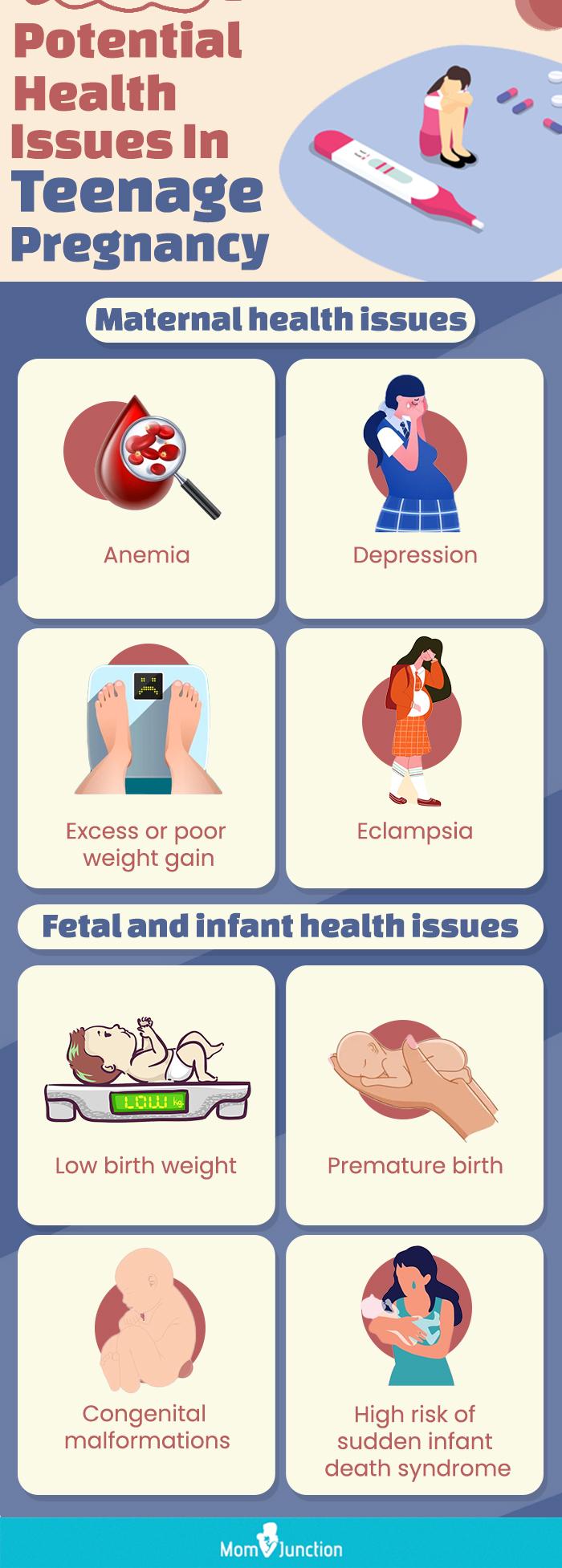
Physical and Emotional Effects of Teen Pregnancy
Teen pregnancy, defined as pregnancy occurring to individuals between the ages of 13 and 19, carries significant physical and emotional consequences that can impact the health and well-being of both the mother and the child. Understanding these effects is crucial for developing effective prevention and support strategies.
Physical Effects
-
Increased Risk of Preterm Birth and Low Birth Weight: Teen mothers are more likely to deliver preterm babies (before 37 weeks of gestation) and low birth weight babies (less than 5 pounds 8 ounces). These infants face a higher risk of health complications, such as respiratory distress syndrome, cerebral palsy, and developmental delays.
-
Gestational Hypertension and Preeclampsia: Teen mothers have an elevated risk of developing gestational hypertension (high blood pressure during pregnancy) and preeclampsia (a serious condition characterized by high blood pressure and protein in the urine). These conditions can lead to premature birth, placental abruption, and eclampsia (a life-threatening seizure disorder).
-
Anemia: Teen mothers are more likely to experience anemia (low iron levels in the blood) during pregnancy. Anemia can cause fatigue, shortness of breath, and increased risk of infection.
-
Increased Risk of Sexually Transmitted Infections (STIs): Teen mothers are more likely to have multiple sexual partners and engage in unprotected sex, increasing their risk of contracting STIs, such as chlamydia, gonorrhea, and HIV. STIs can have serious health consequences, including infertility, pelvic inflammatory disease, and cervical cancer.
-
Long-Term Health Problems: Teen mothers face an increased risk of developing chronic health conditions later in life, such as cardiovascular disease, obesity, and diabetes. These conditions are often linked to poor prenatal care and inadequate nutrition during pregnancy.
Emotional Effects
-
Depression and Anxiety: Teen mothers are more likely to experience depression and anxiety during and after pregnancy. These mental health conditions can affect their ability to bond with their child, care for themselves, and maintain relationships.
-
Low Self-Esteem and Body Image Issues: Teen mothers often struggle with low self-esteem and body image issues. They may feel ashamed of their pregnancy and experience negative judgment from others. These feelings can lead to social isolation and withdrawal.
-
Educational and Career Disruption: Teen pregnancy can disrupt a young woman’s education and career plans. Many teen mothers drop out of school or delay their education to care for their child. This can limit their future opportunities and earning potential.
-
Relationship Problems: Teen mothers often face relationship challenges with their partners, families, and friends. The stress of pregnancy and parenting can strain relationships and lead to conflict.
-
Increased Risk of Child Abuse and Neglect: Teen mothers are more likely to experience child abuse and neglect. They may lack the maturity, resources, and support to provide adequate care for their child.
Social and Economic Consequences
Teen pregnancy also has significant social and economic consequences:
-
Increased Healthcare Costs: Teen pregnancy and its associated health complications can lead to increased healthcare costs for the mother and child.
-
Increased Welfare Dependence: Teen mothers are more likely to rely on welfare and other government assistance programs. This can strain the social safety net and perpetuate cycles of poverty.
-
Increased Incarceration Rates: Teen mothers are more likely to be incarcerated than non-teen mothers. This is often due to factors such as poverty, lack of education, and involvement in the criminal justice system.
Prevention and Support
Preventing teen pregnancy and providing support to teen mothers is essential for improving their health and well-being. Effective strategies include:
-
Comprehensive Sex Education: Providing teens with accurate and age-appropriate information about sexual health, contraception, and pregnancy prevention.
-
Access to Contraception: Ensuring that teens have access to affordable and confidential contraception, such as condoms, birth control pills, and intrauterine devices (IUDs).
-
Parental Involvement: Encouraging open communication between parents and teens about sexual health and pregnancy prevention.
-
Support Services: Providing teen mothers with access to prenatal care, parenting classes, counseling, and other support services to help them navigate the challenges of pregnancy and parenting.
-
Community-Based Programs: Implementing community-based programs that provide comprehensive services to teen mothers and their families, including housing, education, job training, and childcare.
Conclusion
Teen pregnancy has profound physical, emotional, and social consequences that can impact the health and well-being of both the mother and the child. Addressing these consequences requires a multi-faceted approach that includes prevention, support, and community-based interventions. By investing in the health and well-being of teen mothers, we can break the cycle of poverty, improve health outcomes, and create a more equitable society.